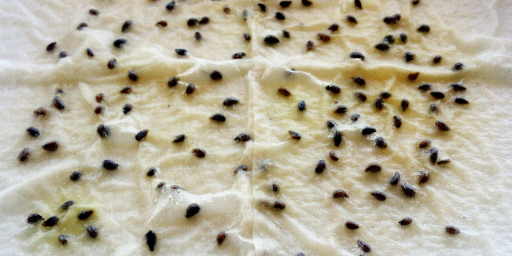
In today’s world, where sustainability is becoming a cornerstone of agricultural practices, the need for eco-friendly solutions is more pressing than ever. One such solution making waves in the agriculture sector is seed germination paper. This simple yet powerful tool plays a significant role in promoting sustainable farming practices, supporting seed development companies, and advancing research in the field of plant science. In this blog, we explore the many advantages of seed germination paper and its invaluable contribution to sustainable agriculture.
What is Seed Germination Paper?
Seed germination paper is a biodegradable and eco-friendly medium used to facilitate the germination of seeds. It is composed of natural fibers, making it a sustainable alternative to traditional germination methods like soil or peat pots. The paper is designed to provide an ideal environment for seeds to sprout, ensuring they receive the right amount of moisture and air circulation.
When seeds are placed on seed germination paper, they receive an optimal setting for germination. The fibers of the paper retain moisture, creating a balanced environment that prevents overwatering, which is a common issue with other germination techniques.
The Environmental Benefits of Seed Germination Paper
Reducing Plastic Waste
One of the most significant environmental benefits of seed germination paper is its eco-friendly nature. Unlike plastic seed trays or pots, which contribute to long-term waste, seed germination paper is biodegradable and decomposes naturally over time. By choosing seed germination paper, farmers, researchers, and even hobbyists can make a positive impact on the environment by reducing plastic pollution in agriculture.
Sustainability at Its Core
Made from sustainable materials like recycled fibers and plant-based components, seed germination paper is a step toward creating a greener future. It supports sustainable agriculture by reducing reliance on synthetic products, enabling organic farming practices, and promoting the growth of healthy plants without harming the environment.
Biodegradability
Once the seeds have germinated, the paper itself biodegrades, leaving no trace behind. This eliminates the need for disposal and ensures that there is no lingering waste in the soil, unlike plastic or foam pots that may take hundreds of years to break down.
Advantages of Using Seed Germination Paper in Agriculture
Enhanced Seed Germination Rates
Seed germination paper provides a controlled environment that promotes higher germination rates. The paper’s moisture-retaining properties help maintain the right conditions for the seeds to sprout, improving their chances of success. This is especially useful for agricultural companies that rely on consistent seed development for large-scale production.
Improved Plant Health
Healthy seedlings are the foundation of a successful crop. Seed germination paper promotes healthier plants by preventing overwatering and allowing better air circulation around the roots. With a more robust start, plants are better equipped to thrive in the field.
Water Conservation
Seed germination paper is designed to retain moisture without becoming soggy. This means it can help conserve water during the germination process, an essential factor in sustainable agriculture. Farmers can optimize water usage, especially in regions where water resources are limited.
Simplifying the Planting Process
For both small-scale farmers and research departments, seed germination paper offers an easy, efficient, and cost-effective solution. The simplicity of the product ensures that anyone, from novice gardeners to seasoned agronomists, can use it with ease. It also simplifies the handling and transplantation of germinated seeds, reducing stress on the delicate seedlings during the transfer process.
Seed Germination Paper’s Role in Sustainable Agriculture
Seed germination paper plays an integral role in reducing the ecological footprint of farming. By helping farmers avoid synthetic materials, it fosters soil health and promotes a healthier ecosystem overall. Moreover, it aligns with global movements toward sustainable agricultural practices by minimizing waste and supporting organic farming methods.
As demand for eco-friendly agricultural solutions grows, seed germination paper stands out as a product that aligns perfectly with the needs of modern, sustainable farming practices.
Benefits for Seed Development Companies and R&D Departments
Seed germination paper brings immense value to seed development companies and research and development departments. These organizations rely heavily on efficient and precise germination methods to test seed viability, monitor plant growth, and develop new crop varieties. The advantages of using seed germination paper in research include:
- Consistent Results: With controlled moisture and airflow, seed germination paper provides consistent results, making it easier to track and monitor the progress of experiments.
- Cost-Effective Research: It offers a more affordable method for testing various seed types and determining their best growth conditions, ultimately supporting the research of new plant breeds.
Real-Life Applications and Case Studies
Seed germination paper is already making waves in various sectors of agriculture and research. From agricultural firms conducting large-scale seed development to botanical research institutes exploring new plant varieties, seed germination paper has proven to be an indispensable tool. Companies have seen remarkable improvements in seedling success rates, faster growth cycles, and more resilient plants, all thanks to this eco-friendly solution.
How to Choose the Right Seed Germination Paper
Selecting the right seed germination paper depends on factors like:
- Paper Thickness: Thicker papers tend to retain moisture better, making them suitable for larger seeds, while thinner papers work well for small seeds.
- Seed Compatibility: It’s essential to match the paper to the type of seeds being used, ensuring optimal moisture levels.
- Environmental Impact: Look for certifications such as FSC (Forest Stewardship Council) to ensure the paper is made from sustainably sourced materials.
Conclusion: Laxmi Industries – Leading the Way in Sustainable Solutions
Since 2004, Laxmi Industries has been a trusted name in the manufacturing of specialty grade papers, including seed germination paper. As a leading supplier to seed development companies and research departments, we pride ourselves on providing high-quality, eco-friendly products that support the advancement of sustainable agriculture. Our commitment to sustainability, combined with our decades of expertise, makes us a reliable partner for businesses and researchers looking to make a positive impact on the environment while promoting healthier plant growth.
Choose Laxmi Industries for your seed germination paper needs and join the movement toward a more sustainable, eco-friendly agricultural future.
